A reliable domain name system (DNS) server can reduce website load times, improve internet speed, and avoid security vulnerabilities. As more and more businesses offer their services over the internet, choosing the fastest and most reliable DNS servers has become more crucial than ever. Given their importance, a global DNS service market report shows that the market will grow from $323 million in 2021 to $710 million by 2028.
While these numbers are laudable for the market, businesses are stuck with the challenge of choosing the most reliable DNS service for their business. This is where DNS benchmark tools come in.
DNS benchmark tools are used to measure the performance and reliability of various DNS servers. Since a slow or unreliable DNS server can cause delays in website loading, affect the internet browsing experience, and even result in security vulnerabilities, DNS benchmark tools help users to identify the fastest and most reliable DNS servers for their needs.
Here are our top picks for the best DNS benchmark tools for your websites.
- GRC DNS Benchmark: Best for nameserver visibility
- DNSPerf: Best for easy accessibility
- NameBench: Best for power users
- DNS Jumper: Best for manual DNS server customization
- DNS Checker: Best for mobile
- MXToolbox: Best for integrated webmaster tools
- DotCom-Tools: Best for mapping DNS trace
- whatsmydns.net: Best for non-technical users
- Top DNS benchmark software comparison
- GRC DNS Benchmark: Best for Nameserver Visibility
- DNSPerf: Best for Easy Accessibility
- NameBench: Best for Power Users
- DNS Jumper: Best for Manual DNS Server Customization
- DNS Checker: Best for Mobile
- MXToolbox: Best for Integrated Webmaster Tools
- DotCom-Tools: Best for Mapping DNS Trace
- whatsmydns.net: Best for Non-Technical Users
- Key Features of DNS Benchmark Tools
- How Do I Choose the Best DNS Benchmark Software for My Business?
- Methodology
Top DNS benchmark software comparison
Below is a comparison table of some of the most critical features of top DNS benchmark tools and their pricing details.
| Product | DNS security (DNSSEC) check | Run test in real time | Reliability check | Customizable | Response time check | Pricing |
|---|---|---|---|---|---|---|
| GRC | ✔ | ✘ | ✔ | ✔ | ✔ | Free |
| DNSPerf | ✘ | ✔ | ✔ | ✔ | ✔ | Free |
| NameBench | ✘ | ✔ | ✔ | ✔ | ✔ | Free |
| DNS Jumper | ✘ | ✘ | ✔ | ✔ | ✔ | Free |
| DNS Checker | ✘ | ✔ | ✔ | ✔ | ✔ | Free |
| MXToolbox | ✔ | ✔ | ✔ | Requires subscription | ✔ | Free, or subscription starting at $129/mo |
| DotCom-Tools | ✘ | ✔ | ✔ | ✔ | ✔ | Free |
| whatsmydns | ✔ | ✔ | ✔ | ✘ | ✔ | Free |
GRC DNS Benchmark: Best for Nameserver Visibility
GRC’s DNS is a popular DNS benchmark tool designed to measure and analyze the performance and reliability of DNS servers. Baked into the GRC’s DNS is the capacity to compare and perform tests on up to 200 DNS nameservers simultaneously.
This tool comes with a default configuration that enables you to launch it as soon as you have it installed. It’s preconfigured to get you started by identifying all DNS name servers your system is configured to use. The tool can also ramp up your list of publicly available nameservers alongside a benchmark list that explains the suitability of each benchmark.
With GRC’s DNS, you can gain visibility into nameservers to see their redirection behavior, minimum response time, reliability, and more.
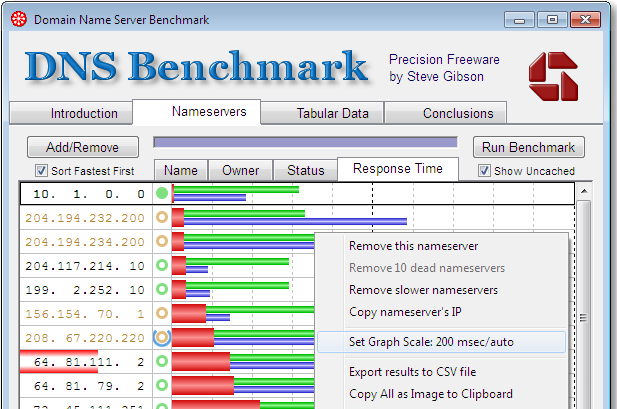
Pricing
- GRC’s DNS is a free tool.
Features
- Gain visibility into what’s going on with currently assigned DNS servers.
- Helps to check whether nameservers provide DNS security (DNSSEC) record authentication.
- Automatically compares server performance with publicly available alternatives.
- Detailed comparison of the performance and reliability of up to 200 DNS servers.
- Identifies all DNS servers the user’s system is configured to use and adds them to the list.
- Characterizes each DNS server to determine the suitability.
- Tests each server to see if it returns an error or redirects to a marketing page.
- Results are continuously displayed and updated while the benchmark is underway.
Pros
- There is rich documentation on how to use this tool.
- Offers easy installation.
Cons
- The GRC’s DNS webpage looks antique and cluttered.
DNSPerf: Best for Easy Accessibility
DNSPerf is another DNS tool that can enable you to test the performance of your DNS provider. Built with the capacity to perform DNS lookup from over 200 locations globally, DNSPerf also allows you to test routing logic and debug your self-hosted servers.
With DNSPerf, there is no need to worry about losing your DNS benchmark analysis result as the tool retains test results for up to 30 days. This feature is good for users who run multiple DNS servers and speed tests every now and then, as it allows them to compare old and new test results. In addition, the tool saves you the additional stress of downloading and installing the program since you can run your test on their official websites.
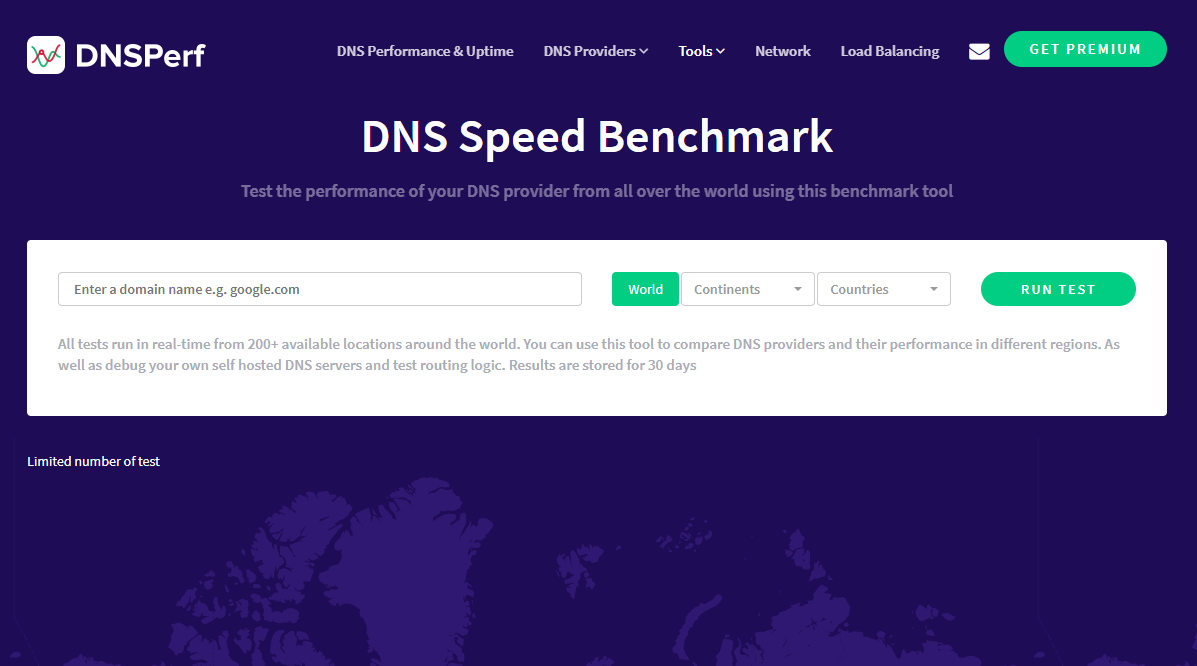
Pricing
- Running DNS testing on DNSPerf is free.
Features
- Tests are run in real time.
- More than 200 available locations around the world.
- Compare DNS providers and their performance in different regions.
- Test results are stored for 30 days.
- It also offers a load balancer and data analytics platform to simplify global traffic management.
Pros
- You can easily compare your old test results with the new ones on the site.
- Tests are run on the website, so downloads or installations are unnecessary.
- Tests are run in real time.
Cons
- There is no room to export the report file.
NameBench: Best for Power Users
NameBench is a Google-owned, free, and open-source DNS benchmark tool. The tool can be used in multiple operating systems such as macOS, Windows, and Unix. Designed mostly for super users, NameBench can be run through the graphical user interface (GUI) or command line interface (CLI).
The tool can run DNS benchmarks by using your website’s browser history, standardized dataset, or tcpdump output. This method helps provide individualized DNS test results and recommendations.
NameBench also allows you to choose a history source for your tests. For instance, you can set your browser as your history source if you want a more personalized result and an Alexa dataset to check nameservers from a global scope.
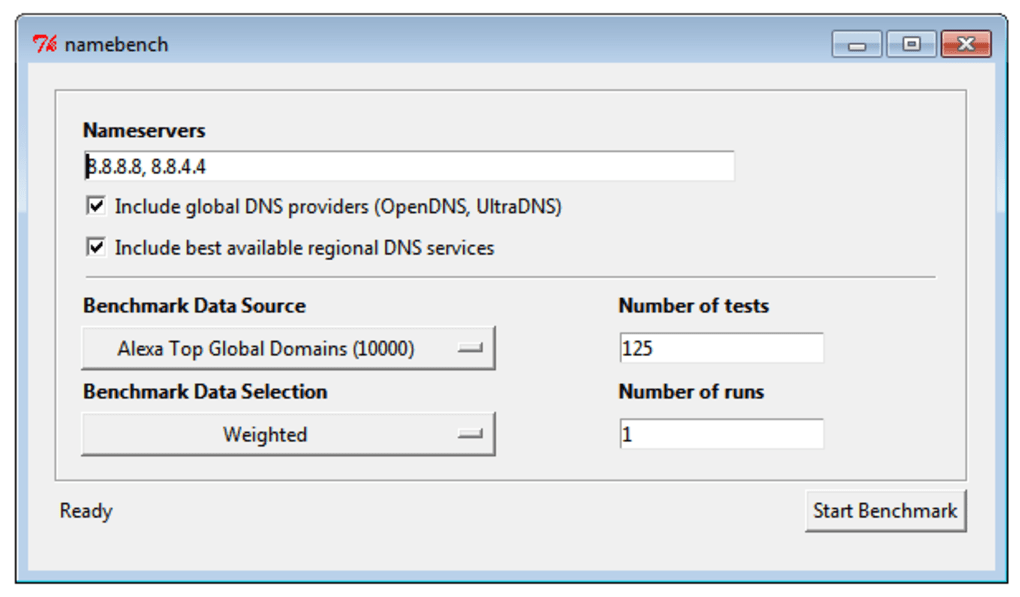
Pricing
- NameBench is a free tool.
Features
- Option to include popular public DNS servers like Google, OpenDNS, and UltraDNS.
- It can test the fastest regional DNS servers in an area or go global with the Alexa dataset.
- It can run on multiple operating systems.
- Censorship checks to test those that provide filtering services.
- Shows the fastest DNS server available based on the exact sites visited using the browser cache.
- Checks are based on the top 2,000 websites.
- Users receive a prioritized list of three server addresses as final recommendations.
- Comes with GUI and CLI.
Pros
- The tool is compatible with all popular operating systems.
- It can run tests from your browsing history and a global dataset.
- The tool provides personalized DNS server recommendations based on your browsing history.
Cons
- New users might struggle to use NameBench.
- Lack of extensive documentation on installation and use.
DNS Jumper: Best for Manual DNS Server Customization
Sordum’s DNS Jumper aids in finding and setting the fastest DNS for a particular system. It’s lightweight, portable, and includes plenty of features. The tool is configured so you don’t have to install it before running your DNS test. Basically, users can run this tool from a USB drive or disk.
DNS Jumper is also packed with features that enable you to access it from a GUI CLI. Another notable feature of this DNS benchmark utility is that it allows users to easily add new entries to the list of their DNS servers. At the same time, the tool also offers users the option to save their original DNS settings and restore them whenever necessary.
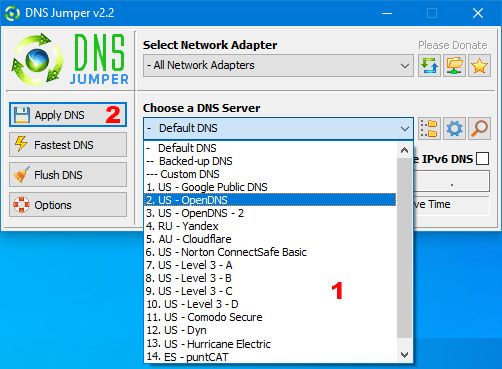
Pricing
- DNS Jumper is free.
Features
- It can be accessed through the GUI or the command line.
- You can add your own language by using the translate feature.
- It can automatically check all listed DNS response times and recommend the fastest one available.
- It can be customized to accept your own DNS server.
- It offers a preconfigured list of 27 different DNS services.
Pros
- It comes with an extensive help section.
- It comes as a lightweight utility tool.
- It provides multiple languages.
Cons
- Test results can not be exported.
DNS Checker: Best for Mobile
DNS Checker is a free online DNS benchmark platform that offers many features that help users with DNS propagation and performance checks globally. This tool also offers a mobile version and Chrome extension for easy access on mobile and desktop devices.
If a user has recently changed DNS records, switched web hosts, or started a new website, it offers a toolset to address the problem. Additionally, with DNS Checker, you can check the DNS data of any domain or hostname from global DNS servers. The tool is also preconfigured by default with a list of over 100 global DNS servers to easily enable DNS server tests.
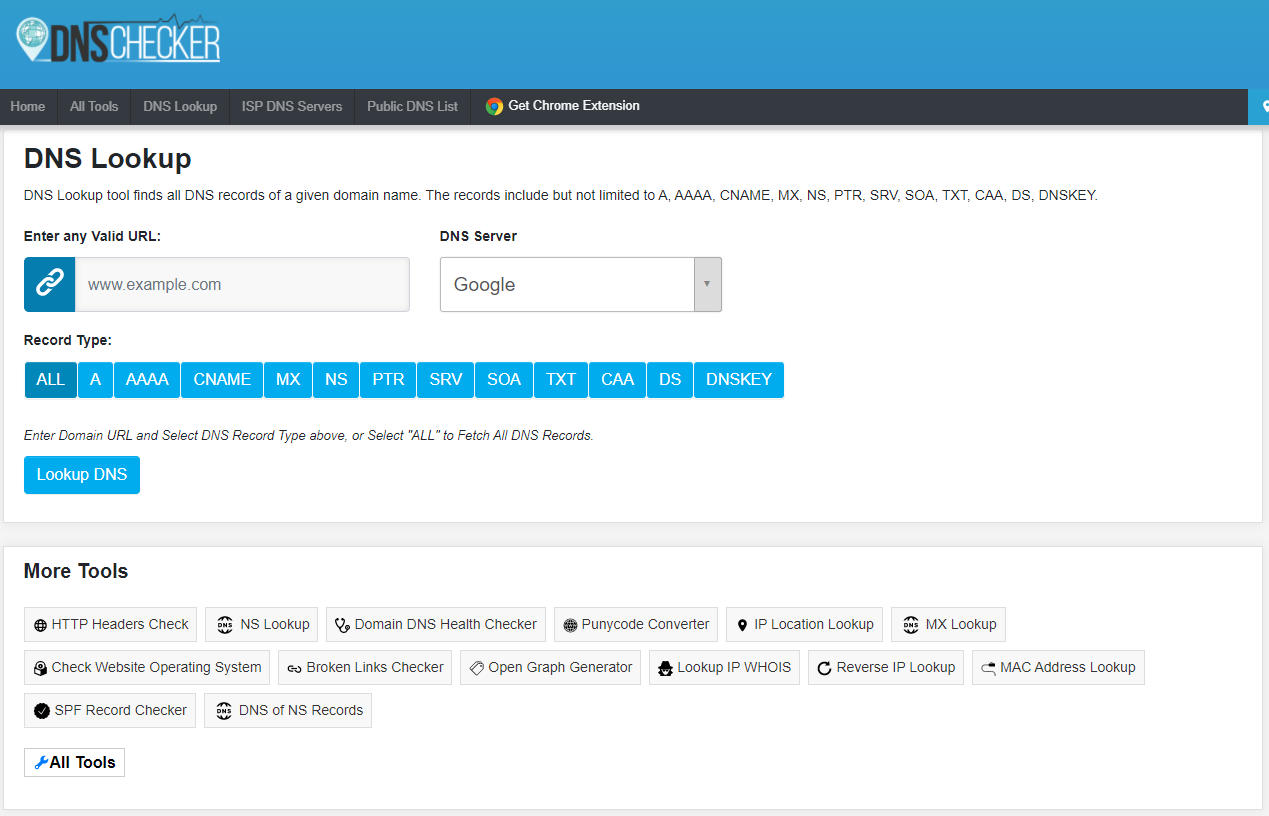
Pricing
- The tool is free.
Features
- Comes with over 100 lists of global DNS servers.
- You can easily add a custom DNS server and perform a DNS check.
- DNSchecker has a mobile version.
- The test results are mapped for easy understanding.
- The tool provides a Chrome extension, which means users can launch it on the go.
Pros
- Users can access the tool via a Chrome extension.
- Mobile-first users can have the tool on their mobile devices.
- DNS Checker website is easy to use, even for first-timers.
Cons
- There’s no option for DNS security check.
MXToolbox: Best for Integrated Webmaster Tools
MXToolbox offers features such as DNS Check and DNS Lookup. Aside from DNS checks, also baked into MXToolbox are other crucial tools such as DMARC checks and other domain and email diagnostic features. These extra features can be used concurrently with DNS checks by businesses that need to ensure an all-around quality web experience beyond DNS. The tool is designed to run a comprehensive DNS report for any domain based on a DNS lookup against root servers.
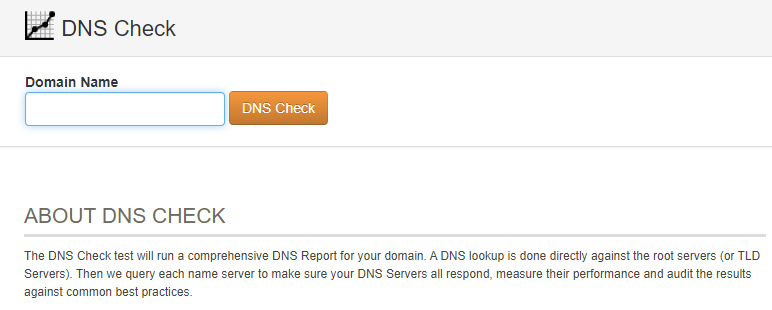
Pricing
- The tool is free but requires payment (ranging from $129/mo. to $399/mo.) to gain access to more features like the email diagnostic tool.
Features
- Queries each name server to make sure DNS servers all respond.
- Measures performance and audits the results against common best practices.
- Supertool combines all MX record, DNS, blacklist, and SMTP diagnostics in one integrated tool.
- Input a domain name, IP address, or hostname and receive a chronological history of results.
- There is a blacklist checker that tests a mail server IP address against over 100 DNS-based email blacklists.
Pros
- The tool encompasses other crucial webmaster tools.
- It’s easy to use.
- The tool offers a blacklist check which helps businesses to reduce spam email.
Cons
- Accessing other critical features comes with a fee.
DotCom-Tools: Best for Mapping DNS Trace
The DotCom-Tools DNS Trace Test can help users lookup test queries root servers to find DNS lookup records detailing the path taken to retrieve authoritative DNS server details.
Apart from detailing the path taken to retrieve DNS server details, this tool’s DNS test results also reveal the time it took to retrieve a response from each node. In addition, it adopts a data tree format in displaying test results, mapping out all the DNS traces.
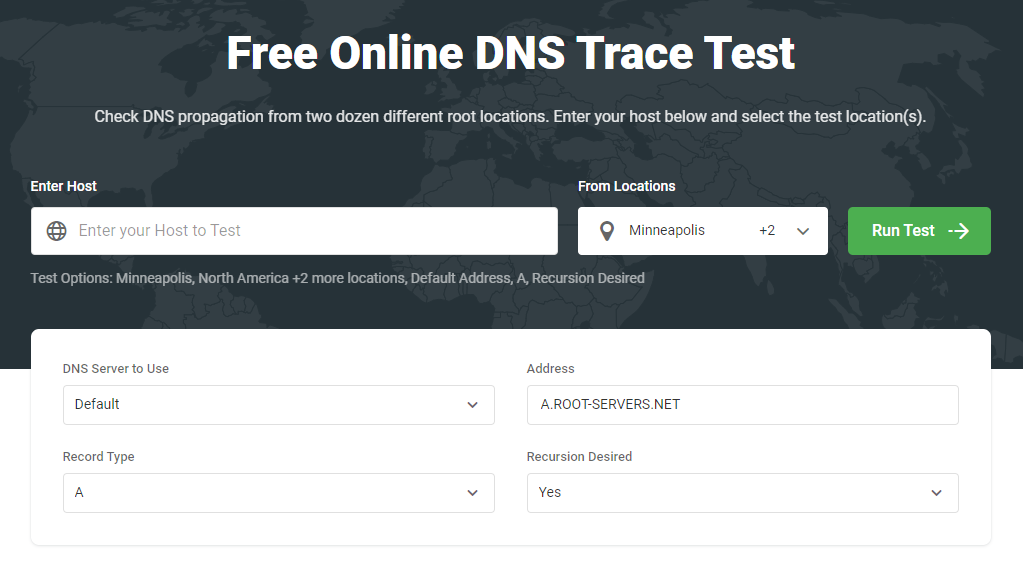
Pricing
- The tool is free.
Features
- Check DNS propagation from dozens of root locations.
- The DNS trace test automatically attempts to resolve IPv4 and IPv6 addresses if available.
- Test results include the time to receive a response from each node along the path, as well as the answers returned from each node.
- Provides a feature that can diagnose DNS issues within your network.
Pros
- You can verify the DNS test results from a non-cached, external independent third party.
- The tool allows you to view your local cache by outputting it into a txt file on your system.
- The DNS test result is detailed.
Cons
- Accessing more locations and saving test history requires payment.
- A static page blocks some texts on the DNS test page on the left side of the screen.
whatsmydns.net: Best for Non-Technical Users
whatsmydns is a web-based utility that’s available for free and allows you to conduct a DNS lookup to verify DNS propagation and obtain details on any domain from DNS servers located in various countries across the globe.
The tool is most suitable for non-technical users as it simplifies the process of conducting global DNS checks by maintaining various DNS servers for performing lookups. The tool parses these results and presents them on a map, making it easier to comprehend the outcomes at a glance. Once the search is completed, users can view the detailed lookup results for each server location from the list or by clicking on the map markers.
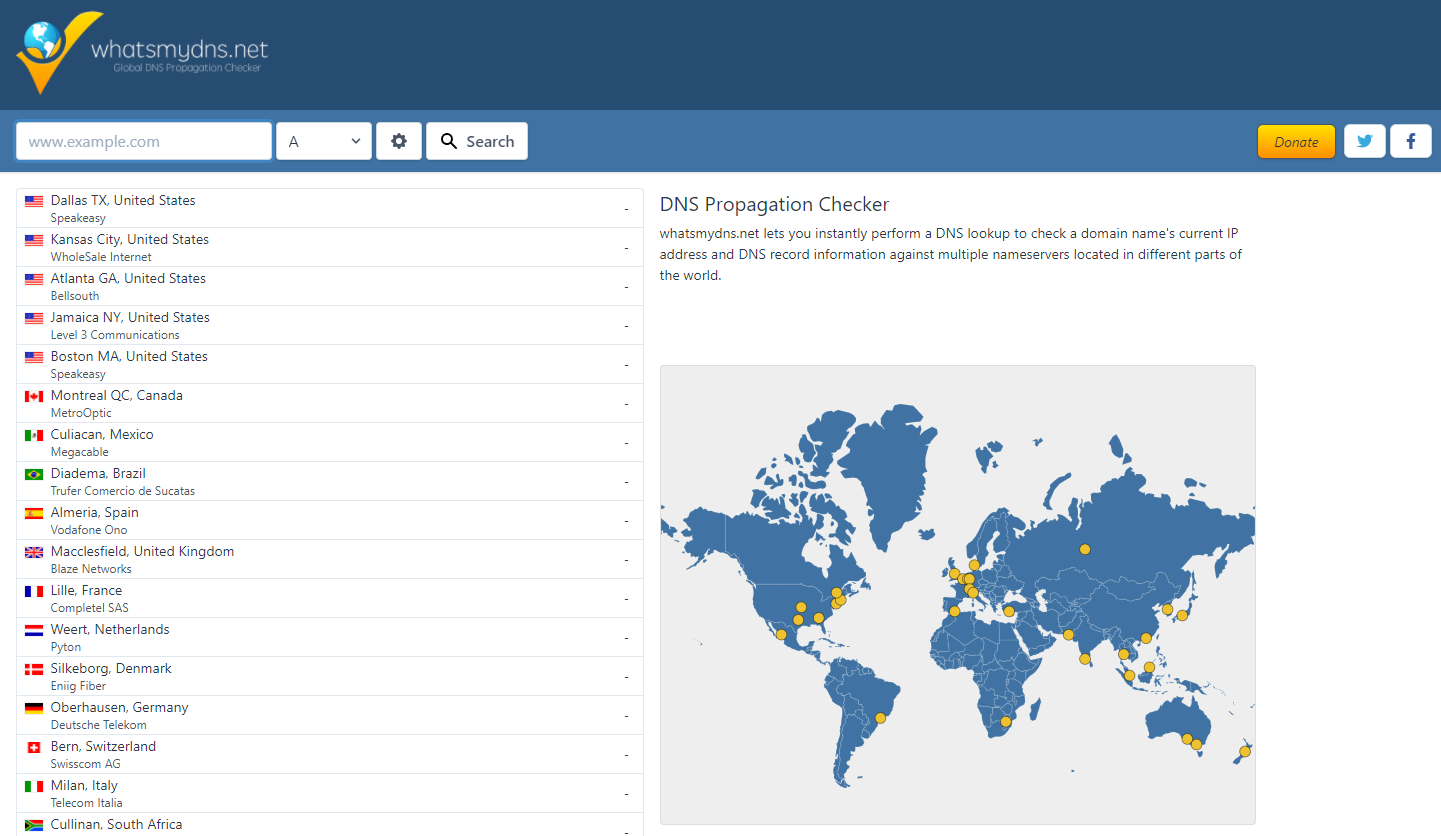
Pricing
- The tool is free.
Features
- Checks if servers have been updated correctly without the need to query remote servers manually.
- There is instant feedback on how users resolve their DNS records for your website and email.
- Makes the process of performing global DNS checks easy by maintaining a range of DNS servers.
- Results are parsed and displayed on a map.
Pros
- Non-technical users can get started with the tool immediately.
- There is a comprehensive guide on the site on how to use the tool.
- You don’t need to download any package before using the device, as it can be accessed directly on the site.
Cons
- There’s no CLI option.
Key Features of DNS Benchmark Tools
Some of the key features you should be looking out for when choosing a DNS benchmark tool include reliability and security testing across different DNS servers, customizable parameters, and historical data.
Ability to test the performance of different DNS servers
One of the primary features of DNS benchmark tools is the ability to test the performance of different DNS servers. These tools typically run a series of DNS lookups on a variety of servers and measure the response times.
This feature is crucial if you must connect to a reliable and fast server. Therefore, look for a tool that can help you identify which servers are the fastest and most responsive from various DNS servers.
Reliability testing
Ensuring that your websites maintain steady uptime is one of the reasons people deploy DNS benchmark tools. Therefore, in addition to performance testing, some DNS benchmark tools can also test the reliability of different DNS servers.
The reliability of a server is an indication that the server will be less likely to experience downtimes or other outage issues. In picking a DNS benchmark tool, ensure that it has the capacity to provide insight into the reliability of servers.
Security testing
Not every DNS benchmark tool offers DNSSEC features. So if the security of your connection is a major concern to you, you should consider picking a tool that offers this feature. Using a DNS tool that offers security testing makes it easy to identify servers that are less likely to be vulnerable to DNS-related attacks, such as DNS cache poisoning, zero-day attacks, and denial of service (DoS) attacks.
Customizable testing parameters
It’s important to ensure that your DNS benchmark tool allows for the customization of testing parameters. This gives room for flexibility in terms of being able to customize the testing parameters to suit your specific needs. For example, you can often choose how many DNS lookups to perform, which servers to test, and how long to wait between lookups.
Historical data
This is the ability of a DNS benchmark tool to retain your DNS check results up to a certain number of times before they go away. Some DNS benchmark tools keep historical data on server performance, which can be useful for tracking changes over time. This feature is also crucial for comparing previous test results and new ones.
Automatic configuration
If you’re not a super user, you may want to have a DNS benchmark tool that can automatically configure your network settings and connect you to the fastest server. If you’re in this category, ensure you pick a DNS benchmark tool that can automatically configure your network settings to use the fastest and most reliable DNS servers identified during testing.
How Do I Choose the Best DNS Benchmark Software for My Business?
When choosing the best DNS benchmark tool, there are several important factors to consider. The first is security. Choosing a tool that tests DNS security is essential to ensure you are connected to a secure server. Tools like GRS DNS and whatsmydns are capable of pulling this off.
Ease of use is another important factor. The tool should be user-friendly and easy to navigate, especially if you aren’t familiar with technical jargon. The interface should be straightforward, so you can easily access the necessary features and settings. Especially for non-technical users, you don’t want to encounter any technical glitches during installation and test times. So check that your preferred DNS benchmark tool has some detailed usage guides.
In addition, consider compatibility when picking a tool. The DNS tool should be compatible with your operating system, browser, and devices. This ensures that you can use the tool without any compatibility issues. Fortunately, most of the tools we reviewed can be run from the browser without needing package installation.
Features are also important. You should look for a DNS benchmark tool that offers features such as the ability to test multiple DNS servers at once, save and export results, and test DNS server response times. These features can help you to get the most out of the tool and make informed decisions about your DNS server.
Another factor that should influence your choice of a DNS benchmark tool is the flexibility of customization. The tool should allow you to customize the testing parameters to suit your needs. This may include the number of queries, query type, and other settings. Customization allows you to test the DNS server in a way that is tailored to your needs and provides more accurate results.
Methodology
We chose these DNS benchmark tools by comparing the most popular DNS benchmark tools and narrowed down our decision to the eight above based on some key features we found in each of the tools. For instance, we found that while all the tools were free, they had some notable differences in terms of DNS security, speed and accuracy, customization parameters, ease of use and reporting features available in them. We found these features to be critical in every DNS tool, which informed our decision to review each tool, highlighting their notable features, pros, and cons.
Read more: Best Server Monitoring Software and Tools

